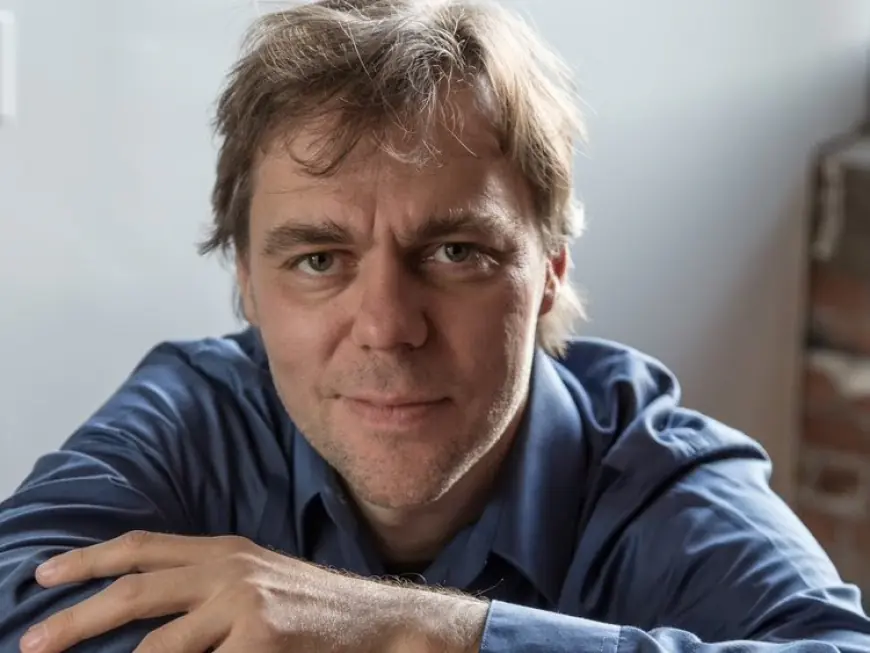Lithuanian Pianist Andrius Zlabys Evokes Voyager Probes’ Eternal Journey in Athenaeum Recital
Forty-seven-year-old Lithuanian-born pianist Andrius Zlabys paid a call at La Jolla’s Athenaeum on Monday night with a commanding recital of J.S. Bach, Cesar Franck, and a composition of his own. A product of Philadelphia’s Curtis Institute and now lecturer/instructor at Boston University and Bard College, Zlabys’ career has included a Grammy nomination, performances with the […]



Forty-seven-year-old Lithuanian-born pianist Andrius Zlabys paid a call at La Jolla’s Athenaeum on Monday night with a commanding recital of J.S. Bach, Cesar Franck, and a composition of his own.
A product of Philadelphia’s Curtis Institute and now lecturer/instructor at Boston University and Bard College, Zlabys’ career has included a Grammy nomination, performances with the likes of the New York Philharmonic, and joint ventures with the revered Kremerata Baltica chamber orchestra.
Composing has emerged as a second career. “Although I have spent my whole life improvising at the piano, writing things down—composing—came later,” he recently admitted via email. “I love playing contemporary music. I have commissioned and premiered a number of works written for me. I always try to include a new work [in my programs]. This time, it is my own.”
Zlabys’s nine-and-a-half-minute “Echoes of Light” — dedicated to his Curtis Institute mentor, Armenian-American pianist Sergei Babayan — was born as a “stumbled upon” improvisation that evolved to include shards of Mozart’s Requiem (it’s subtitled ‘Homage to W.A. Mozart’). It begins with a shimmer of tremolo effects conjuring the infinity of space. In his program note, Zlabys acknowledges the influence of astronomer Carl Sagan, who designed the Golden Record of earth sounds (including three Bach pieces and two minutes of Mozart) that NASA’s Voyager probes launched skyward in 1977.
Soon, ‘Echoes’ intergalactic reverberations intensify into a discordant, heavy-chorded climax before a pause reintroduces the opening’s resonating ocean of sound. Evocatively played by Zlabys, the piece artfully imagines music — “the most beautiful of which humanity [is] capable” — eternally surviving the blackness of space.
“When I decide on a recital program,” Zlabys told me, “the way I group the pieces doesn’t always have an obvious logic; it is more an intuitive sense that one piece in a program will respond to the feelings of the other works.”
The two pieces that preceded ‘Echoes of Light’ dovetailed it both logically and intuitively. The recital began with J.S. Bach’s seven-movement Partita No. 6 in E minor — “one of the most significant works in my repertoire,” Zlabys notes. “My need to play Bach is often unrelated to performing in public. When I spend time with Bach, my mind and heart travels through an experience that leaves me more hopeful and happier, making better sense of the world around me. This feeling is what I strive to share with my audiences.”
And share he did. Though in his day, Bach was criticized for an “impersonal focus on musical technique” (as one historian put it), Zlabys’s extroverted but always tasteful interpretation showed why Bach’s notoriously demanding sixth partita — intended, incredibly, as a keyboard exercise for amateur private study — has been called his greatest suite.
Zlabys had the full measure of Bach’s rhythmic and contrapuntal hurdles, playing with springing attack, well-gauged dynamic contrast, clear but nimble articulation, and confident mastery of Bach’s polyphony. The dances (allemande, courante, sarabande) danced; the closing gigue blazed with dramatic fire.
Zlabys launched the evening’s second half with Cesar Franck’s “Prelude, Chorale, and Fugue” (1884), which he admits, “I spent my childhood listening to. [I] was overjoyed when I was old enough and good enough to learn it.” As a composition student of Beethoven’s friend, Antonin Reicha, Franck absorbed Bach’s counterpoint, which the last third of his ‘Prelude, Chorale, and Fugue’ makes clear.
Here, the extroversion that served Zlabys so well in the Bach did him fewer favors. Some missed notes aside, to this listener it felt a bit over the top and even ragged. But given the virtuosity that bookended this piece, no foul.
As if to swing the evening back to its wellspring, Zlaby’s two fine encores were a Bach chorale in F minor and the sarabande from his French Suite No. 2 in C minor.
Paul Bodine is a San Diego writer.
What's Your Reaction?









































































































